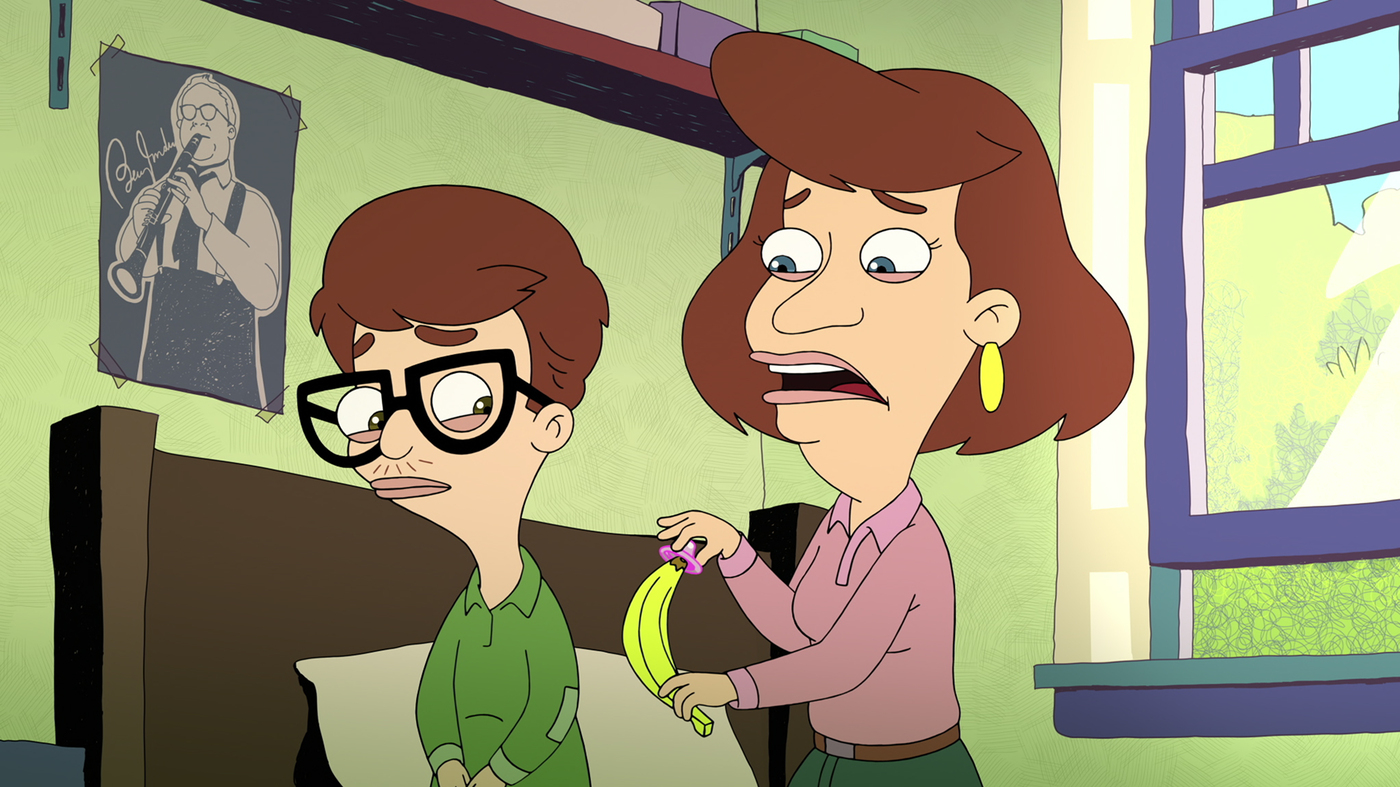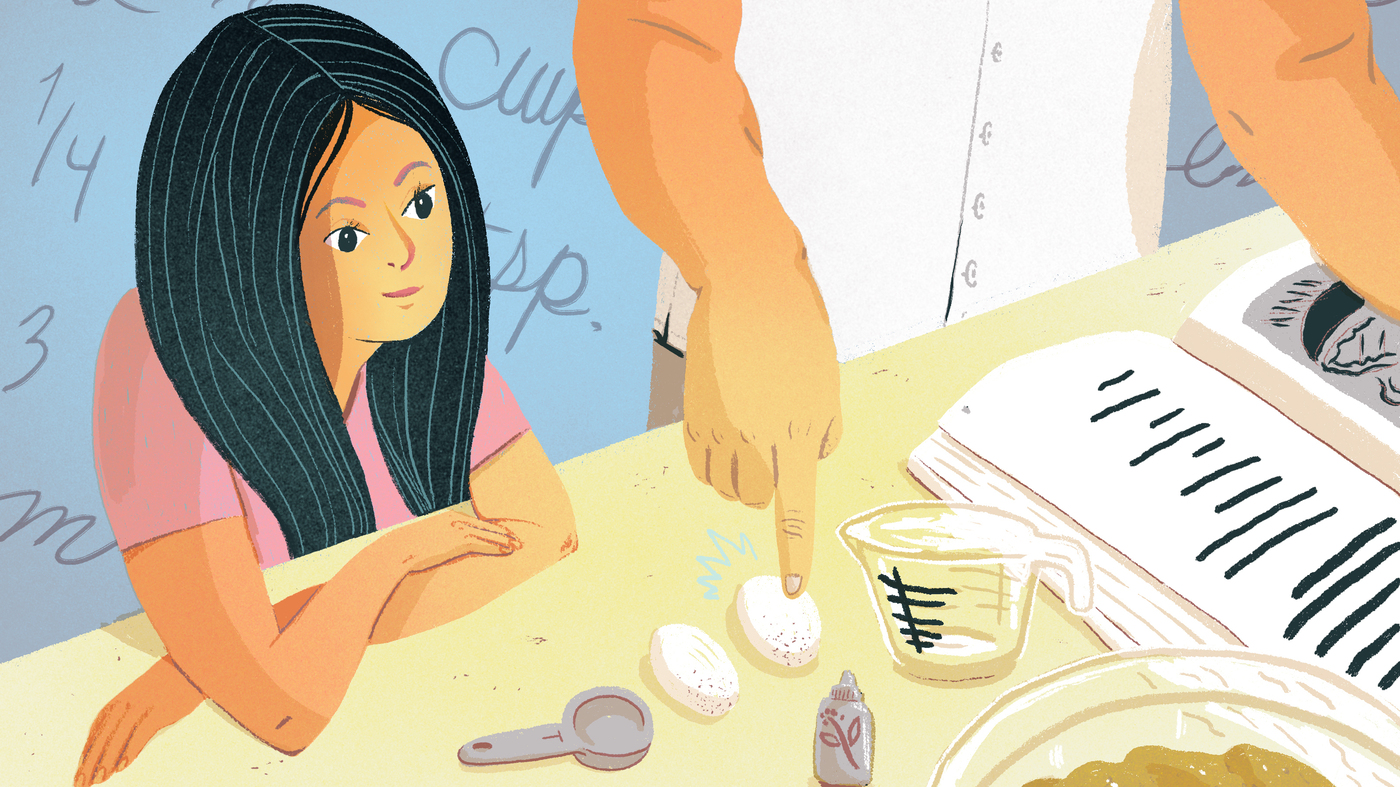Life Kit: Parenting
Raising awesome kids takes help. NPR has science and experts to get you through the toughest parenting moments. Subscribe to get episodes from Life Kit on parenting.
Kids & Family 44 rész
Talking With Kids About Anti-Asian Racism
11 perc
44. rész
Navigating conversations with kids around race and racism can be tricky. Here's what to think about while talking to kids about the rise in anti-Asian attacks and the shootings in Atlanta earlier this month.
Helping Teens Cope With Mental Health Struggles
22 perc
43. rész
Over a year into the pandemic, many teens are missing milestones and struggling with their mental health. Here's how to spot red flags and when to get help.
Deciding When To Have A Baby
24 perc
42. rész
Whether you've always wanted to be a parent or not, starting a family is a big decision. The pandemic makes it even tougher. In this episode, experts talk through what to consider.
What To Tell Kids When The News Is Scary
25 perc
41. rész
When the headlines are terrifying, how can parents make sure kids get the facts without traumatizing them? Whether it's a school shooting, a global pandemic or an insurrection on the U.S. Capitol, child development experts have some advice. (This episode originally ran in March 2019.)
Helping Kids (And Parents) Cope During COVID-19
21 perc
40. rész
Kids and teens have had their lives upended by COVID-19. Here's what parents can do to help them stay positive and feel supported.
Transforming Kids' Worries Into Superpowers
18 perc
39. rész
Kids have anxiety — but it's not always a bad thing. Renee Jain and Dr. Shefali Tsabary have some ideas about how to help children use those feelings to their advantage.
How To Raise Good Citizens
23 perc
38. rész
Now is a good time to talk to the kids in your life about how to engage in civics. Here's a primer from our Life Kit parenting team.
FAFSA 2020: Here's How To Apply For College Financial Aid
15 perc
37. rész
The Free Application for Federal Student Aid is now open to potential college students to fill out. Here's how to fill out the form to get money for college — and why you should apply now instead of waiting.
A Simple Equation to Help Kids Love Math
23 perc
36. rész
Math anxiety is real for kids and adults. But parents can help. The solution goes beyond equations and textbooks.
How To Make Sure Your Child Learns This School Year
15 perc
35. rész
This school year, families with children are in a serious bind. Whether you're looking for options for childcare or need resources to keep your kid entertained, this episode will walk through some ideas to think about.
How To Work With — Not Against — Screen Time
15 perc
34. rész
Some parents think the best way to manage a child's screen time is to set hard limits. But those rules are particularly difficult to keep during a pandemic, when screens are a lifeline for all of us. So what should the rules be? Sonia Livingstone and Alicia Blum-Ross, coauthors of Parenting For A Digital Future, explain why being too strict about screen time might not be the best strategy for your kids — or the whole family.
Kids Know How To Occupy Themselves. We Need To Let Them Do It
12 perc
33. rész
American parents often feel like event planners for their kids. There's a pressure to make sure kids are entertained and content every minute of the day. NPR's Michaeleen Doucleff says kids can be trained to occupy themselves.
Discussing 'The Talk'
20 perc
32. rész
It's Been A Minute host Sam Sanders talks with his colleague Kenya Young, executive producer of Morning Edition and mother of three boys about "the talk" — The series of conversations black parents have with their kids, particularly their sons, about how to deal with police encounters.
How White Parents Can Talk To Their Kids About Race
10 perc
31. rész
NPR's Michel Martin talks with Jennifer Harvey, author of Raising White Kids: Bringing Up Children in a Racially Unjust America, about how to talk with white kids about racially charged events — and how to keep the conversation going. If you're a white (or nonblack) parent, don't wait for your kids to bring up the topic of race to start the discussion, says Harvey.
Be Honest And Concrete: Tips For Talking To Kids About Death
23 perc
30. rész
Whether it's a family pet or a loved one, every child will experience a death at some point — and their parents will likely struggle to explain it. This episode, we revisit the Mr. Hooper episode of Sesame Street, which provides a master class in talking about death and grief with young children.
Decision Day Is Almost Here. Here's How To Decide For An Unknown Future
16 perc
29. rész
While it's hard to know what college will look like this fall, college decision day is almost here. So what can students do to make a sound choice during this uncertain time? Education reporter Elissa Nadworny gives an update on what incoming college students need to know about appealing financial aid, changing plans and thinking through a gap year.
When Will This Be Over? Sesame Workshop's Tips For Parenting During A Pandemic
17 perc
28. rész
Many parents are struggling right now — juggling kids at home 24/7 and coping with their own losses. In this episode, Rosemarie Truglio, a developmental psychologist and senior vice president of curriculum and content at Sesame Workshop, offers helpful pandemic parenting tips.
Sesame Street's Grover On Coping During Coronavirus: Just For Kids
12 perc
27. rész
Hey kids! Sesame Street's Grover is here and he's got some great ideas for making your days brighter during coronavirus. Grover explains how to make virtual play dates more fun, how to daydream and how to be a helper.
Kid-Friendly TV Show Recommendations
16 perc
26. rész
Parenting during self-isolation can be challenging, and let's be honest — sometimes screen time helps you just get through the day. Our friends at Pop Culture Happy Hour offer TV recommendations for those with young kids at home.
Here's How To Pick A College During The Coronavirus Pandemic
21 perc
25. rész
The coronavirus pandemic is making college decisions more complicated. This episode answers the burning questions: How do I get a hold of final transcripts if my school is closed? How do I decide on a school I can't visit? What if I need more financial aid than I thought I did?
6 Tips For Homeschooling During Coronavirus
17 perc
24. rész
Tens of millions of parents are homeschooling their kids during the coronavirus. Here's a realistic guide to keeping kids engaged and everyone sane. Hint: this is a good time for passion projects and sleeping in a bit.
Coronavirus And Parenting: What You Need To Know Now
13 perc
23. rész
Coronavirus is raising a lot of questions for parents. From how to talk to children about coronavirus to weathering school closures, enforcing good hygiene and some screen time strategies when you're home with little ones, Life Kit answers your coronavirus questions.
'Big Mouth' Creators On Embracing The Awkwardness Of Puberty
17 perc
22. rész
Nick Kroll and Andrew Goldberg are the co-creators of 'Big Mouth,' an animated comedy about a group of tweens stumbling through the mysteries of puberty. Kroll and Goldberg talk with Life Kit parenting hosts about normalizing shame, building empathy, weathering awkward puberty moments and hormone monsters.
What Your Teen Wishes You Knew About Sex Education
27 perc
21. rész
Consent, dating, masturbation, porn. It can be difficult talking with teens about sex and relationships. NPR's Life Kit has a few tips to help make those conversations with your kids a little easier.
Helping A Child Whose Parent Is Struggling With Addiction
25 perc
20. rész
What can you do if you suspect a child is being impacted by a family member's addiction? Experts say you don't need to be an addiction expert, just a caring adult. This episode offers guidance to help a kid through a tumultuous time.
What Is Postpartum Depression? Recognizing The Signs And Getting Help
25 perc
19. rész
One in seven women experiences postpartum depression. But it's easy to feel alone — especially when you're told having a baby is supposed to be blissful. This episode helps both struggling moms and loved ones identify the symptoms and find treatment.
The Birds And The Bees — How To Talk To Children About Sex
26 perc
18. rész
Sex, genitals, consent, self-touching — it's tricky to talk to younger kids about these topics. This episode helps parents get past the confusion and embarrassment around sex education so they can raise healthy, responsible kids.
How To Help A Child Struggling With Anxiety
24 perc
17. rész
When is your kid just scared of the dark and when are they dealing with a larger anxiety disorder? This episode will teach you how to help a child with anxiety and reach them in stressful moments.
How To Talk To Kids About Climate Change
23 perc
16. rész
Today's kids are bombarded with the realities of climate change — whether through extreme weather or in the news. These tips will help you and your kids cope with the overwhelming feelings to move beyond helplessness and toward action.
Rethinking Brilliance: Raising Caring, Collaborative Kids
16 perc
15. rész
We all want our kids to succeed, but that doesn't mean running math drills. Author Kathy Hirsh-Pasek explains the "6 C's" that kids need to thrive and why raising brilliant kids starts with redefining brilliant.
From First Phones To Online Porn: Answers To Your Screentime Questions
21 perc
14. rész
NPR's Life Kit answers parents' questions about their kids' screen use. Education consultant Ana Homayoun says it's all about empowering your kids to make good decisions when you're not around.
Parents, Check Your Own Screen Habits
22 perc
13. rész
From distracted parenting to "sharenting," an honest look at our own use of electronic media can make us into more skillful parents and better role models.
Here's what to remember:
- Put your phone away whenever possible when you're with your kids.
- If you want calmer children, be a more focused parent.
- Before you post a picture or share a cute story about your kids on social media, think twice and get their permission if possible.
- Don't use technology to stalk your children.
- Work for healthier technology for your kids, and for all of us.
Here's what to remember:
- Put your phone away whenever possible when you're with your kids.
- If you want calmer children, be a more focused parent.
- Before you post a picture or share a cute story about your kids on social media, think twice and get their permission if possible.
- Don't use technology to stalk your children.
- Work for healthier technology for your kids, and for all of us.
The Darker Side Of Screen Time
28 perc
12. rész
Emotional outbursts. Lost sleep. These are signs that your kids are spending too much time with digital devices. Here's what you can do about it.
Here's what to remember:
- Pay attention to your children's emotional relationship with screens, not just how much time they are spending with them.
- Don't just make technology rules based on time.
- Do guard bedtimes and mealtimes.
- Don't expect taking away the phone to solve all your family's problems.
- Mentor your kids; don't just monitor them.
Here's what to remember:
- Pay attention to your children's emotional relationship with screens, not just how much time they are spending with them.
- Don't just make technology rules based on time.
- Do guard bedtimes and mealtimes.
- Don't expect taking away the phone to solve all your family's problems.
- Mentor your kids; don't just monitor them.
The Brighter Side of Screen Time
23 perc
11. rész
The family that plays video games together, stays together. When parents become digital mentors, children can learn empathy, resilience, and prepare for future careers. Here's how to harness the advantages of screen time.
Here's what to remember:
- Whenever possible, share screens with your kids.
- Balancing screen use is about much more than time.
- Be smart about content.
- Look for what's positive about your kids' screen time so you can help those positive things grow.
Here's what to remember:
- Whenever possible, share screens with your kids.
- Balancing screen use is about much more than time.
- Be smart about content.
- Look for what's positive about your kids' screen time so you can help those positive things grow.
'We Wanted To Show Children Real Life': Sesame Street's Sonia Manzano
18 perc
10. rész
Actress Sonia Manzano is beloved by millions as Maria on Sesame Street. Her character on TV mirrored many of Manzano's real-life milestones, like marriage and motherhood (Elmo served as ring bearer for Maria's wedding on the show). She also wrote for Sesame Street in later years, and helped the show address diversity issues. In this special episode, Manzano reflects on her 44 seasons on Sesame Street, what she thinks was the show's most poignant moment — and which Muppet was secretly her favorite.
What Cookie Monster Taught Us About Self-Control
26 perc
9. rész
Self-regulation skills, including self-control, help us reach our goals, learn in school and get along with others. Millions of children struggle to develop them. We talk to experts for strategies to teach these skills — and get some very special help from Cookie Monster.
Here's what to remember:
- Look at self-regulation as a skill that can be learned and practiced.
- Teach children to calm themselves.
- Use your imagination to reframe a temptation.
- What would Batman do? Kids can channel their heroes to make it easier to live up to their values.
- Be strategic about distractions.
- Build self-regulation skills with activities like martial arts or music lessons.
Here's what to remember:
- Look at self-regulation as a skill that can be learned and practiced.
- Teach children to calm themselves.
- Use your imagination to reframe a temptation.
- What would Batman do? Kids can channel their heroes to make it easier to live up to their values.
- Be strategic about distractions.
- Build self-regulation skills with activities like martial arts or music lessons.
Raising Kids Who Love Math — Even If You Don't
23 perc
8. rész
By some estimates, up to 93% of American adults have some degree of math anxiety. The problem often starts in elementary school, but parents can do a lot to fix it. We talk to experts to get some some unexpected strategies for children of all ages, with a little bit of help from Sesame Street head writer Ken Scarborough and, of course, the Count.
Here's what to remember:
- Your own math anxiety doesn't have to hold your kids back.
- Talk about math when you're sharing everyday activities.
- Play math — with board games, card games, puzzles, and more.
- Forget about right and wrong answers. Keep things open-ended — life, and math, are more fun that way.
Here's what to remember:
- Your own math anxiety doesn't have to hold your kids back.
- Talk about math when you're sharing everyday activities.
- Play math — with board games, card games, puzzles, and more.
- Forget about right and wrong answers. Keep things open-ended — life, and math, are more fun that way.
Kindness Can Be Taught. Here's How
31 perc
7. rész
Most kids value success and achievement more than caring for others, according to Harvard's Making Caring Common project. Who is to blame? We are. We talk to experts for ideas on how to do better, and why.
Here's what to remember:
- Children are born to be kind — but also unkind.
- Kindness requires courage.To build kindness, practice mindfulness.
- Teach real apologies, and frame forgiveness as a gift you give yourself.
- Practice gratitude to "raise the capital" of everyday kindness.
- Kindness is a habit; rituals, chores and service can all help.
Here's what to remember:
- Children are born to be kind — but also unkind.
- Kindness requires courage.To build kindness, practice mindfulness.
- Teach real apologies, and frame forgiveness as a gift you give yourself.
- Practice gratitude to "raise the capital" of everyday kindness.
- Kindness is a habit; rituals, chores and service can all help.
When The News Is Scary, What To Say To Kids
26 perc
6. rész
Whether a school shooting or a deadly tornado, scary events in the news can leave parents struggling to know when — and how — they should talk with their kids about it. Rosemarie Truglio of Sesame Workshop and Tara Conley, a media studies professor at Montclair State University, give us tips.
- Limit their exposure to breaking news.
- For the really big stories, pick a quiet moment and start the conversation by asking what kids have heard and how they're feeling.
- Give facts and context: Let kids know that most scary news events are rare. Show them where it is happening on a map.
- When they ask why something happened, avoid labels like "bad guys."
- Encourage kids to process the story through play, art, even video.
- Take positive action together.
- Limit their exposure to breaking news.
- For the really big stories, pick a quiet moment and start the conversation by asking what kids have heard and how they're feeling.
- Give facts and context: Let kids know that most scary news events are rare. Show them where it is happening on a map.
- When they ask why something happened, avoid labels like "bad guys."
- Encourage kids to process the story through play, art, even video.
- Take positive action together.
'What If We Lived In Two Houses?' Talking Kids Through Divorce
22 perc
5. rész
Even the most amicable split is world-changing for young children. Here are a few key tips for grown-ups trying to help their kids navigate this big transition.
- Give children as much heads-up as you can — as soon as you've made a definite decision to split up.
- It's a grown-up problem. Don't share details that will confuse your child or hurt your partner.
- Don't fear the big feelings or the "pajama truth-bomb."
- It's good for kids to talk about a separation — even when it may be painful for adults to hear.
- Make sure your kids know that not everything will change.
- Keep routines, and toys, consistent, even if they're traveling from one home to another.
- Look back together on the good memories.
- Give children as much heads-up as you can — as soon as you've made a definite decision to split up.
- It's a grown-up problem. Don't share details that will confuse your child or hurt your partner.
- Don't fear the big feelings or the "pajama truth-bomb."
- It's good for kids to talk about a separation — even when it may be painful for adults to hear.
- Make sure your kids know that not everything will change.
- Keep routines, and toys, consistent, even if they're traveling from one home to another.
- Look back together on the good memories.
The Problem With Toy Guns And Princesses
26 perc
4. rész
Whether it's mini-makeup kits, gross-smelling slime or semi-automatic foam-dart guns, every parent or caregiver has fielded requests for toys that they're just not that into. We talk about princesses and superheroes and their influence on kids with Rosemarie Truglio of Sesame Workshop and Lisa Dinella, a gender studies professor at Monmouth University.
Here's what to remember:
- Banning toys outright can be counterproductive.
- Pay more attention to how kids play than what they're playing with.
- Fight sexism in the playroom by broadening toy selections.
- Talk directly to your kids about your values.
- Join in your child's play to help expand the possibilities.
- Grossed out? Use toilet toys as a chance to teach science — and manners.
Here's what to remember:
- Banning toys outright can be counterproductive.
- Pay more attention to how kids play than what they're playing with.
- Fight sexism in the playroom by broadening toy selections.
- Talk directly to your kids about your values.
- Join in your child's play to help expand the possibilities.
- Grossed out? Use toilet toys as a chance to teach science — and manners.
Death: Talking With Kids About The End
24 perc
3. rész
Whether it's a goldfish or Grandma, every child will experience a death at some point — and their parents will likely struggle to explain it.
Here's what to remember:
- Be honest and concrete. The cat wasn't put to sleep, and Grandma didn't go on a long journey.
- Don't overwhelm kids with too much information. They need time to process.
- Make sure kids know they're still surrounded by people who will love and support them.
- Don't be afraid to show emotion.
- When it comes to deathbed visits or funerals, tell kids what they might see and give them a choice.
- Keep the hope alive!
Here's what to remember:
- Be honest and concrete. The cat wasn't put to sleep, and Grandma didn't go on a long journey.
- Don't overwhelm kids with too much information. They need time to process.
- Make sure kids know they're still surrounded by people who will love and support them.
- Don't be afraid to show emotion.
- When it comes to deathbed visits or funerals, tell kids what they might see and give them a choice.
- Keep the hope alive!
Talking Race With Young Children
20 perc
2. rész
Even babies notice differences like skin color, eye shape and hair texture. Here's how to handle conversations about race, racism, diversity and inclusion, even with very young children.
A few things to remember:
- Don't shush or shut them down if they mention race.
- Don't wait for kids to bring it up.
- Be proactive: Help them build a positive awareness of diversity.
- When a child experiences prejudice, grown-ups need to both address the feelings and fight the prejudices.
- You don't have to avoid topics like slavery or the Holocaust. Instead, give the facts and focus on resistance and allies.
A few things to remember:
- Don't shush or shut them down if they mention race.
- Don't wait for kids to bring it up.
- Be proactive: Help them build a positive awareness of diversity.
- When a child experiences prejudice, grown-ups need to both address the feelings and fight the prejudices.
- You don't have to avoid topics like slavery or the Holocaust. Instead, give the facts and focus on resistance and allies.
Is It OK To Lie About Santa And The Tooth Fairy?
18 perc
1. rész
Magical thinking is part of childhood, and when it comes to characters like Santa Claus and the Tooth Fairy, parents often play along with elaborate charades. But what should grown-ups do when kids start aging out of the magic and asking tough questions?











































